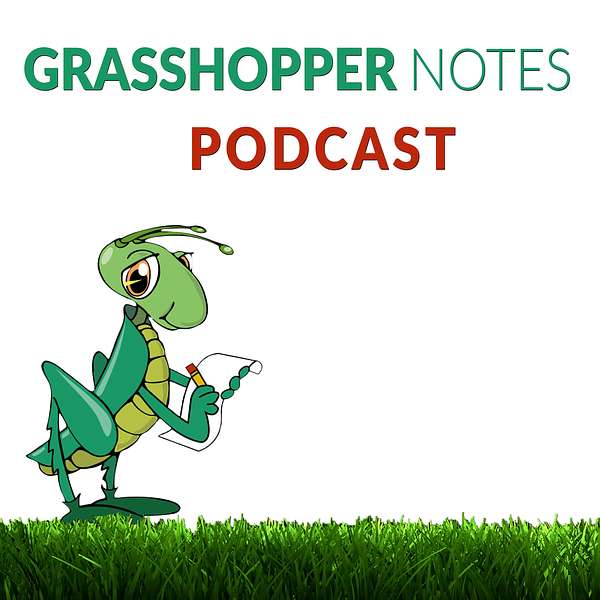
Grasshopper Notes Podcast
The Grasshopper Notes Podcast is hosted by John Morgan the man who has been billed as America’s Best Known Hypnotherapist.
John’s podcasts are a collection of guided meditations and bite-sized, mini podcasts which open you to new ways of thinking, communicating, and responding. You get a finer appreciation of how your mind works and how to use your internal resources to your best advantage.
See a video of John's background at the following link: https://www.youtube.com/watch?v=XbCPd00ok0I
In short, John Morgan is a people helper. Explore this channel and see what he can help you discover.
Grasshopper Notes Podcast
This Means That
Use Left/Right to seek, Home/End to jump to start or end. Hold shift to jump forward or backward.
When we equate an emotion with meaning, we're headed down a drama trail. Find out how to reading the warning signs to avoid that excursion.
Grasshopper Notes are the writings from America's Best Known Hypnotherapist John Morgan. His podcasts contain his most responded to essays and blog posts from the past two decades.
Find the written versions of these podcasts on John's podcasting site: https://www.buzzsprout.com/1628038
"The Grasshopper" is the part of you that whispers pearls of wisdom that seem to pop into your mind from out of the blue. John's essays and blog posts are his interpretations of these "Nips of Nectar." Others have labeled his writings as timeless wisdom.
Most of the John's writings revolve around self improvement and self help. They address topics like:
• Mindfulness
• Peace of mind
• Creativity
• How to stay in the present moment
• Spirituality
• Behavior improvement
And stories that transform you to a wider sense of awareness that presents more options. And isn't that what we all want, more options?
John uploads these podcasts on a regular basis. So check back often to hear these podcasts heard around the world. Who wants to be the next person to change?
Make sure to order a copy of John's new book: WISDOM OF THE GRASSHOPPER – 21 Days to Creativity. These mini-meditations take you inside where all your creative resources live. And you'll come out not only refreshed but recommitted to creating your future.
It's only $16.95 and available at BLURB.COM at the link below. https://www.blurb.com/b/10239673-wisd...
Also, download John's FREE book INTER RUPTION: The Magic Key To Lasting Change. It's available at John's website https://GrasshopperNotes.com
This Means That
Did you ever notice when you get emotional, you attach meaning to it?
We all get emotional over something and then we ascribe a reason to the feeling. The shorthand we use in these situations is: “This means that.”
My experience is when we equate an emotional "this" with "that," we go on a downward spiral towards drama. Our transport vehicle is the “woe is me” wagon.
The next time you get emotional (yes, there will be a next time), stop and notice the sensations in your body that go along with the emotion. The sensations will register somewhere, usually along the front half of your body from your head to your bowels. For example, we can all relate to a lump in our throat, a gurgling in our stomach, a flushed feeling in our face, etc.
The trick to avoid the ensuing drama is to notice the sensations that go along with the emotion. That puts your attention on the sensations rather than having it go into “this means that” mode.
“This” rarely ever means “that.” I’m reminded of one of my favorite observances I learned from Dr. Robert Anthony. He said, “You’re rarely upset for the reason you think.”
It’s the thinking about the sensations that has them catch fire and start to burn out of control. If you begin noticing the sensations without ascribing meaning, you prevent “this” from becoming “that” and you won’t cause a 4-alarm blaze.
Get in the habit of exploring the sensations that go along with an emotion. That means to actually feel them, not equate them. Feeling is an in-body experience; equating is a long head-trip elsewhere.
The sensations want to be noticed. That’s why they acted up in the first place. They want you to pay attention to them, not judge them. By paying attention, we let them have their “say,” allowing them to more quickly go on their merry way.
Application of this strategy turns “I’m sad because” into just “I’m sad.” There is no meaning attached to “I’m sad,” just the opportunity to feel the sensations that go along with sad.
Once you begin to ascribe meaning, you guarantee that you'll be mean to yourself and insure that heartburn won’t be far behind.
Jump off the meaning wagon and you’ll stop the never ending “tit for tat” that goes along with “this means that.”
All the best,
John
